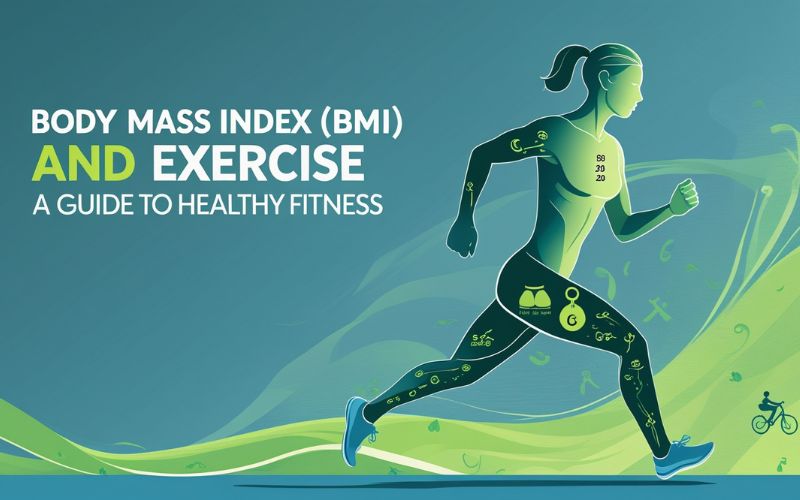Table of Contents
Introduction
For many, BMI is just a number—a calculation that labels individuals as underweight, normal weight, overweight, or obese. But in reality, BMI can be a useful starting point in shaping an effective fitness plan.
Exercise plays a vital role in balancing BMI, but not all workouts suit everyone. The key lies in aligning physical activity with your current BMI to ensure safe and efficient progress toward a healthier body.
What is BMI? How It Affects Your Fitness Goals
Body Mass Index (BMI) is a simple formula: weight (kg) ÷ height (m²). It provides a general indication of whether an individual has a healthy weight for their height. While BMI doesn’t account for muscle mass or fat distribution, it serves as a broad guideline to assess weight-related health risks.
| BMI Range | Category |
| Below 18.5 | Underweight |
| 18.5 – 24.9 | Normal Weight |
| 25 – 29.9 | Overweight |
| 30+ | Obese |
A high BMI often correlates with an increased risk of heart disease, diabetes, and joint issues. On the other hand, a low BMI might indicate nutrient deficiencies or weak muscle mass. Adjusting exercise routines based on BMI can optimize both weight management and overall well-being.
The Best Types of Exercises Based on Your BMI
Different BMI categories require different exercise strategies to ensure progress without risking injury or overexertion.
- Underweight (BMI <18.5)
Individuals with a low BMI should focus on strength training to build muscle mass. Resistance exercises like weightlifting, squats, and deadlifts help increase lean body mass while maintaining overall strength. Compound movements, combined with proper nutrition, play a crucial role in gaining healthy weight. - Normal Weight (BMI 18.5 – 24.9)
Those in the healthy BMI range benefit from a balanced mix of strength training and cardiovascular workouts. Resistance training maintains muscle tone, while activities like running, cycling, or swimming promote cardiovascular health. The goal is to sustain fitness rather than drastic weight changes. - Overweight (BMI 25 – 29.9)
Individuals with a slightly elevated BMI should prioritize fat loss while preserving muscle. High-intensity interval training (HIIT), brisk walking, and resistance training are effective. These exercises help burn calories while boosting metabolism. Low-impact activities, like swimming or rowing, reduce stress on joints. - Obese (BMI 30+)
Those with a BMI above 30 should focus on gradual weight loss to minimize strain on the body. Low-impact exercises such as water aerobics, yoga, and incline walking are effective. Strength training should be included but with controlled intensity to prevent injury. Building endurance first before advancing to high-intensity workouts is crucial.
How to Improve Your BMI Through Strategic Workouts
Simply exercising isn’t enough—targeted strategies make a difference in achieving an optimal BMI.
- Consistency Over Intensity
Overtraining can be counterproductive. Regular, moderate workouts yield better long-term results than sporadic, intense sessions. - Progressive Overload
Gradually increasing resistance or workout intensity prevents plateaus and promotes muscle growth and fat loss. - Incorporating Functional Movements
Exercises that mimic real-life movements, like lunges, push-ups, and planks, improve mobility and core strength. - Cardio and Resistance Combination
A blend of strength training and cardiovascular workouts enhances fat loss while preserving muscle. - Monitoring Recovery
Adequate rest, hydration, and nutrition are just as essential as the workouts themselves for sustained BMI improvement.
The Role of Supplements in Supporting BMI Management
Proper nutrition is the foundation of any fitness journey, but supplements can offer additional support in managing BMI effectively.
- For Underweight Individuals
- Protein Powders: Help meet daily protein requirements for muscle growth.
- Mass Gainers: Provide a calorie-dense formula for healthy weight gain.
- Creatine: Enhances strength and muscle hydration, leading to improved performance.
- For Overweight and Obese Individuals
- Fat Burners: Aid metabolism but should be combined with proper diet and exercise.
- Fiber Supplements: Promote satiety and regulate digestion, preventing overeating.
- Green Tea Extract: Supports fat oxidation and energy levels.
- For Overall Health and Maintenance
- Multivitamins: Fill in nutritional gaps and support metabolic functions.
- Omega-3 Fatty Acids: Reduce inflammation and improve heart health.
- Electrolytes: Prevent dehydration during high-intensity workouts.
While supplements can be beneficial, they should never replace whole foods. A well-balanced diet rich in lean proteins, complex carbohydrates, and healthy fats remains the primary driver of BMI optimization.
Achieving a Balanced and Sustainable Fitness Journey
Managing BMI isn’t about extreme weight loss or muscle gain—it’s about balance. A personalized exercise routine, backed by proper nutrition and supplements, paves the way for long-term health and fitness.
Instead of chasing quick fixes, focus on gradual, sustainable progress. Whether the goal is gaining muscle, losing fat, or maintaining a healthy weight, consistency and dedication are the ultimate game changers.


























